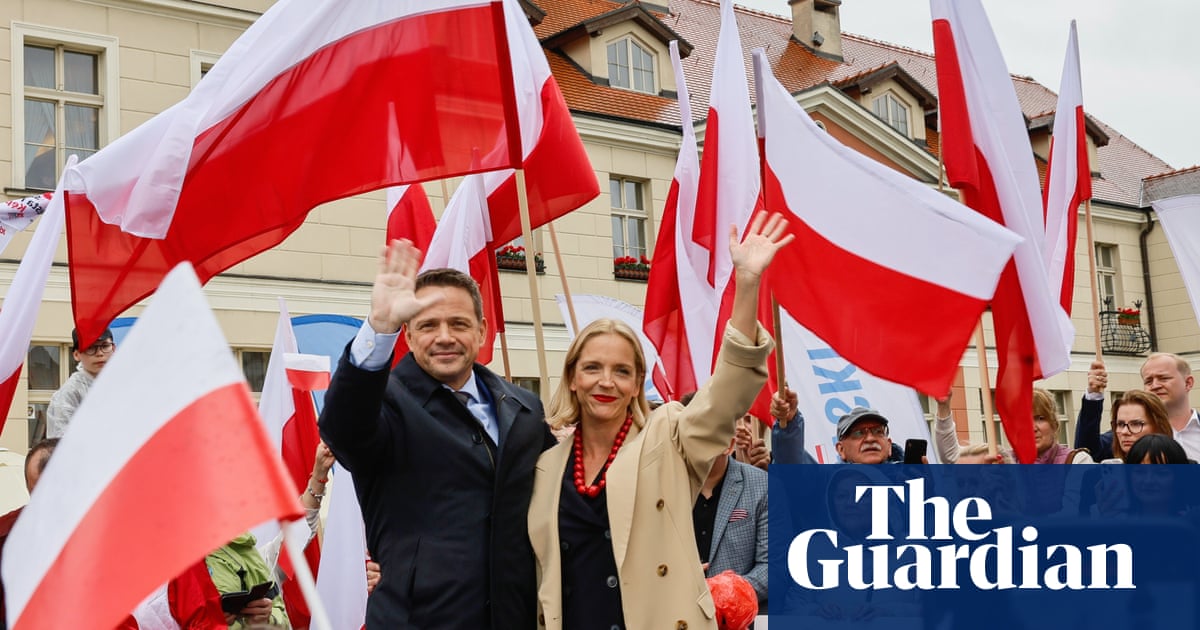Poland’s presidential election runoff could have far-reaching implications for its place inEurope– either cementing the country’s hard-won seat at the EU’s top table, or heralding a return to altogether trickier times.
The mayor of Warsaw, Rafał Trzaskowski, faces off against the historian Karol Nawrocki on Sundayin a neck-and-neck race, pitting a liberal vision of Poland at the heart of European policymaking against a nationalist, radical-right, EU-critical stance.
Trzaskowski is backed by the Civic Platform coalition of the prime minister, Donald Tusk,which won parliamentary elections in 2023. Nawrocki is backed by the opposition Law and Justice (PiS) party, which was in power for the eight previous years.
While in theory Polish presidents have limited influence over foreign policy, a win for Nawrocki, backed by PiS, would inevitably – and, eventually, significantly – constrain Poland’s European ambitions, analysts say.
“We’re not so much talking direct policy consequences,” said Piotr Buras of the European Council on Foreign Relations thinktank. “But if Trzaskowski, Tusk’s candidate, loses, the message is that Poles reject him and his government.”
Deprived of that legitimacy, Tusk “will struggle to play the big role in the EU he has started to play”, Buras said. “His government will be weaker, its room for manoeuvre will shrink. It’s about Poland’s capacity to play a strong role on the EU stage.”
Tusk’s electoral victory two years ago marked the beginning of Poland’s return to the European fold after two fractious terms of populist national-conservative rule during which Warsawclashed repeatedly with Brusselsover rule of law concerns.
PiS also regularly picked unnecessary fights with Germany, and in many EU debates sided with the illiberal Hungarian government of the prime minister, Viktor Orbán, the bloc’s disrupter-in-chief, further alienating Poland from the European mainstream.
The return of Tusk, elected on a promise to undo most of the PiS-era reforms, led to a sea change in relations, with the EU rapidly unblocking more than €100bn of funds it had frozen in retaliation for Poland’s backsliding on democratic norms.
Bolstered by a thriving economy, rising prosperity and its strategic importance in the resistance to Russia’s war on Ukraine, Warsaw has transformed itself in two short years into one of the EU’s most influential capitals, best buddies with Berlin and Paris.
But its full return to the EU fold can be complete only if Tusk can deliver on those key reforms – in particular, rolling backPiS’s politicisation of the court system– that have so far been blocked by the outgoing PiS-aligned president, Andrzej Duda.
Polish presidents have few executive powers. They serve as commander-in-chief of the armed forces, so can seek to shape security policy – and they have the power to veto legislation or refer it to a constitutional tribunal, effectively stalling it.
That is a prerogative Duda has exercised on several occasions – and Nawrocki, who would seek to use his position to undermine Tusk at every turn before parliamentary elections in 2027, could be expected to be even more radical and confrontational.
“A Nawrocki victory would put the stalemate that has existed between government and president since 2023 on a much more permanent footing,” said Nicolai von Ondarza of the German Institute for International and Security Affairs (SWP).
Sign up toThis is Europe
The most pressing stories and debates for Europeans – from identity to economics to the environment
after newsletter promotion
“It would change the political calculation within Poland itself – and it would refocus European attention on the unfulfilled promises on rule-of-law that are actually the basis of Poland’s renewed relationship with the EU.”
While EU leaders would be unlikely to turn the screw on Tusk (“The last thing they would want to do is weaken him further,” Von Ondarza said), the prime minister’s influence in key decisions, such as the bloc’s future budget, would inevitably wane.
Nawrocki would back the PiS government’s approach of “building alternative EU alliances”, for example with Hungary and Slovakia, “as the most effective way of advancing Poland’s interests”,said Aleks Szczerbiakof the University of Sussex.
Szczerbiak added that Nawrocki would certainly also prioritise maintaining close ties with the US, which he has said is Poland’s only credible security guarantor, and “oppose the development of a European defence capability outside Nato structures”.
Buras agreed: “Nawrocki has been heavily critical of Tusk’s backing for Europe’s strategic security shift away from reliance on the US. He is a Trumpist; he was invited to the White House. There will be a constant tension there, around security policy.”
Tensions between Tusk and Nawrocki would be exacerbated by splits that already exist within the prime minister’s disparate coalition of centrists, progressive leftists and conservatives, with policy over Ukraine already a victim of political divisions.
There is broad consensus in Poland on the need to continue military aid to Ukraine. But Tusk himself has had to acknowledge public concern around the coalition of the willing, saying Poland would not participate, and over Ukraine’s EU membership.
Nawrocki has gone further, tapping into Polish anti-Ukrainian sentiment over refugees and strongly criticising Kyiv and its EU and Nato accession plans. “As with migration and climate,” Von Ondarza said, “these issues are all more political.”
But the big threat, concluded Buras, is long-term. “Nawrocki’s role would be to undermine Tusk, make it hard for him to govern, and pave the way for PiS in 2027,” he said. “That could be quite a realistic prospect – and a very big deal for Europe.”
